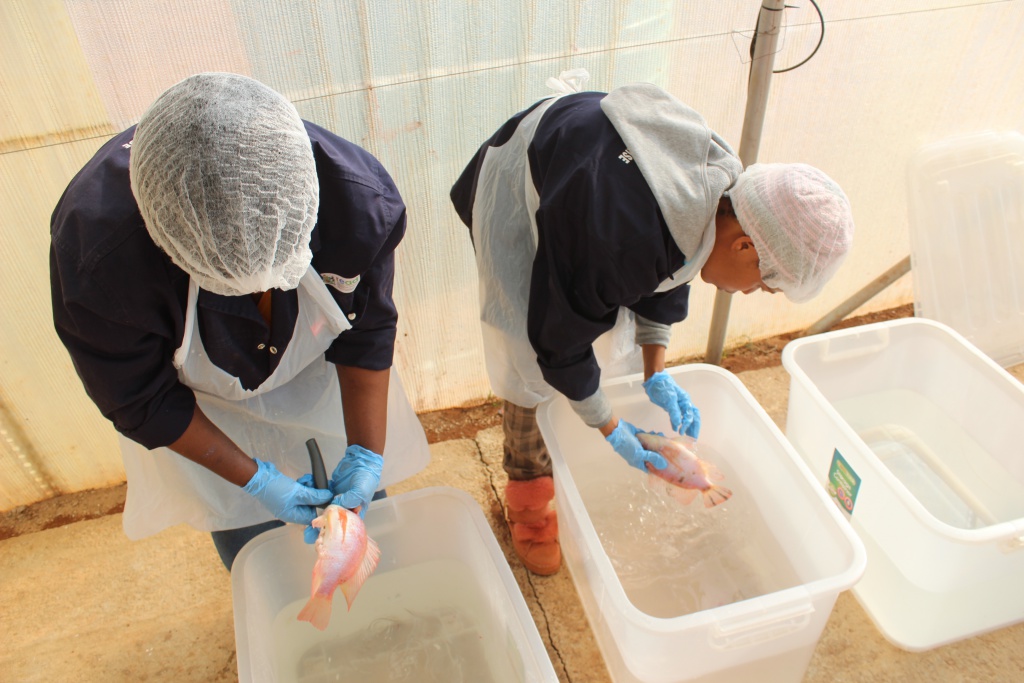Mahikeng – While much work remains, successful efforts by the North West Department of Agriculture and Rural Development in establishing agri-projects across the province is bearing some fruits.
The department has established number of agri-projects mostly in the rural parts of the province to stimulate the economy, alleviate poverty and advancement of rural communities.
One such project is Mathotshe Business Enterprises. The project is situated in Doornkop, thirty kilometers (30 km) outside Ventersdorp town and is farming with aquaculture and aquaponics.
Aquaponics is a way of producing food that combines aquaculture (farming aquatic animals such as snails and fish) with hydroponics (cultivating plants in water) in a symbiotic environment. In this type of farming, the plants get their nutrients from the nutrient rich water produced by the fish wastes.
The farm specializes with Nile Tilapia and is headed by a female, Ms. Salome Mathobela. The beneficiary is the first black woman in South Africa to receive the Nile Tilapia permit. She also has Mozambiccus permit and she is a member of Tilapia Association South Africa (TASA).
For years, Ms Mathobela toyed with the idea of owning aquaponic farm.
In 2014 she finally bought herself a bare land and established her own farm.
Three years down the line, her dream of expanding and increasing production became a reality when the North West Department of Agriculture and Rural Development in the Province offered to support her project with infrastructure through its Comprehensive Agriculture Support Programme.
Thorough this programme, the government invested with the following infrastructure equipments in the enterprise: two large (2) tunnels, fully equipped solar system with control room for power, a generator, fourteen (14) ponds and production inputs.
The farm now specializes with Nile Tilapia with the capacity of producing 13tons of fish per annum. Mathobela also grow vegetables in the area around these seven ponds/tanks, as these will absorb potentially harmful gases escaping from the tanks while helping to create a warm, tropical climate conducive to the wellbeing of the fish.
The plants are grown organically and no chemical fertilisers or pesticides are used.
“We keep things as natural as possible. We harvest one (1) ton of tilapia fish every month,” Mathobela indicated. While aquaponic is often perceived as complicated, Mathobela says that the system operates on very simple principles.
“The fishes’ waste is then broken down by nitrifying bacteria, initially into nitrites and subsequently into nitrates, which the plants utilise as nutrients,” Mathobela explains.
The farm also produces a variety of leaf vegetables that are sold in colourful, mixed packs.
They include jasmine tomatoes, green beans, green pepper and spinach.
“We are currently selling and supplying various stores in North West and Gauteng Province with organic vegetables and fish.
“I truly believe that diversification production through aquaculture and aquaponics practices is the future of farming. It works in rural or urban areas and all you need is a little know-how,” Mathobela highlighted.
The department has monitoring mechanisms in place to oversee the day-to-day running of these cooperatives and to ensure sustainability.
Mathobela has acknowledged the department’s contribution in assisting her to get necessary skills.
“I have an official from the department who is always available for advice. Through her assistance, I managed to attend a number of aquaculture and fishery awareness campaigns, farmer’s days, training organized by the department and that has helped me a lot to improve my farming skills.
This official has also linked me with commercial farmers.
Currently the farm has five (5) permanent employees. It creates five (5) temporary jobs every month during fish harvesting. Annually, it creates over fifteen (15) temporary jobs for weed control and during planting of vegetables.
One of the employees is Ntsoaki Maria Molosi (20) from the neighbouring village of Mafole. She enjoys working at Mathotshe Business Enterprise.
“I enjoy working here and since my arrival I have learned a lot and developed interest for fish farming,” Molosi said.
Molosi also has a dream of having her own farm just like her employer. The owner, Ms Mathobela says food security is at the heart of her farm and is hoping that soon her business will grow to create more jobs.
Her project is one of many which are supported by the department responding to high rate of unemployment amongst North West Province communities who are still locked in cycles of generational poverty and food insecurity.
The support programme from the department also includes training of beneficiaries, mentoring and technical assistance by state Extension Officers.
Issued by the Communication Services Directorate
Enquiries: Ms Emelda Setlhako
Tel: 018 389 5684 Cell: 060 745 4020
Email: ESetlhako@nwpg.gov.za
Website:dard.nwpg.gov.za
Facebook:www.facebook.com/dard
Twitter: @nwpg _dard

